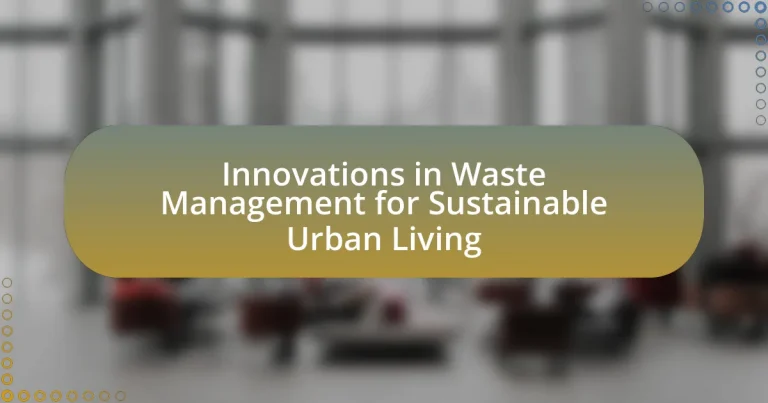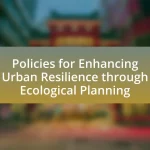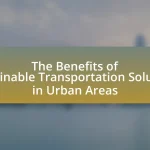Innovations in waste management are essential for promoting sustainable urban living, encompassing advanced recycling technologies, waste-to-energy systems, and smart waste collection solutions. These innovations significantly reduce landfill waste, enhance recycling rates, and improve resource recovery, contributing to environmental sustainability and public health. Key technologies include automated sorting systems, IoT-enabled smart bins, and data analytics, which optimize waste collection and processing. The article also addresses the challenges cities face in implementing these innovations, the role of community engagement, and best practices for effective waste management, highlighting the importance of financial models and educational initiatives in fostering sustainable practices.
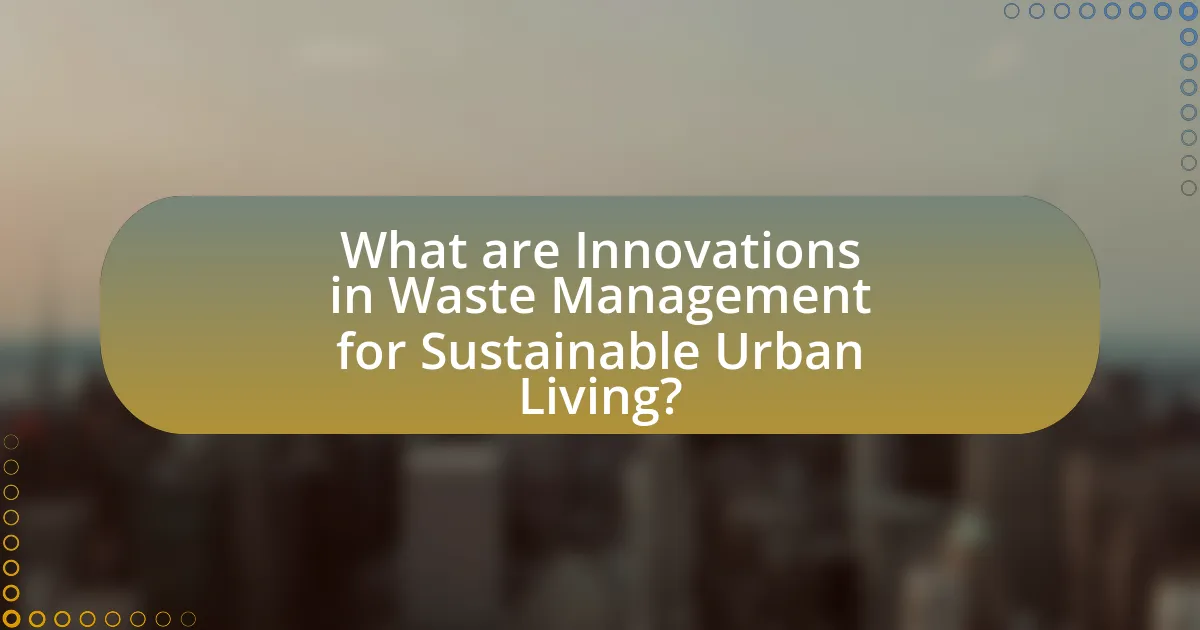
What are Innovations in Waste Management for Sustainable Urban Living?
Innovations in waste management for sustainable urban living include advanced recycling technologies, waste-to-energy systems, and smart waste collection solutions. Advanced recycling technologies, such as chemical recycling, allow for the breakdown of plastics into their original monomers, enabling the creation of new products without degrading quality. Waste-to-energy systems convert non-recyclable waste into usable energy through processes like incineration or anaerobic digestion, significantly reducing landfill use and generating electricity. Smart waste collection solutions utilize IoT sensors in waste bins to optimize collection routes and schedules, reducing fuel consumption and operational costs. These innovations collectively contribute to more efficient waste management practices, promoting sustainability in urban environments.
How do these innovations contribute to sustainability in urban areas?
Innovations in waste management contribute to sustainability in urban areas by reducing landfill waste, promoting recycling, and enhancing resource recovery. For instance, advanced sorting technologies and anaerobic digestion systems enable cities to divert organic waste from landfills, significantly lowering greenhouse gas emissions. According to the Environmental Protection Agency, recycling and composting prevented the release of approximately 186 million metric tons of carbon dioxide equivalent into the air in 2018. Additionally, smart waste management systems optimize collection routes, reducing fuel consumption and operational costs. These innovations collectively foster a circular economy, where materials are reused and repurposed, thus minimizing environmental impact and promoting sustainable urban living.
What specific technologies are being implemented in waste management?
Specific technologies being implemented in waste management include automated sorting systems, waste-to-energy conversion technologies, and smart waste bins equipped with sensors. Automated sorting systems utilize advanced robotics and artificial intelligence to efficiently separate recyclables from general waste, significantly improving recycling rates. Waste-to-energy technologies convert non-recyclable waste into usable energy through processes like incineration and anaerobic digestion, contributing to energy recovery and reducing landfill use. Smart waste bins, equipped with sensors, monitor fill levels and optimize collection routes, enhancing operational efficiency and reducing carbon emissions associated with waste collection. These technologies collectively support sustainable urban living by minimizing waste and maximizing resource recovery.
How do these technologies improve waste collection and processing?
Technologies improve waste collection and processing by enhancing efficiency, accuracy, and sustainability. For instance, smart waste bins equipped with sensors can monitor fill levels and optimize collection routes, reducing fuel consumption and operational costs. According to a study by the World Bank, implementing smart waste management systems can lead to a 30% reduction in collection costs. Additionally, advanced sorting technologies, such as AI-driven machines, increase recycling rates by accurately separating materials, which can improve recycling efficiency by up to 50%. These innovations contribute to more effective waste management practices, ultimately supporting sustainable urban living.
Why is waste management crucial for urban living?
Waste management is crucial for urban living because it directly impacts public health, environmental sustainability, and resource conservation. Effective waste management systems reduce the risk of disease transmission by minimizing waste accumulation, which can attract pests and create unsanitary conditions. According to the World Health Organization, improper waste disposal contributes to health issues such as respiratory infections and gastrointestinal diseases. Furthermore, efficient waste management practices, such as recycling and composting, help reduce landfill use and greenhouse gas emissions, supporting urban sustainability goals. The United Nations Environment Programme highlights that cities generating over 2 billion tons of waste annually must adopt innovative waste management strategies to mitigate environmental impacts and promote a circular economy.
What are the environmental impacts of poor waste management?
Poor waste management leads to significant environmental impacts, including soil contamination, water pollution, and air quality deterioration. When waste is improperly disposed of, hazardous materials can leach into the soil, affecting local ecosystems and potentially entering the food chain. For instance, a study by the World Bank indicates that improper waste disposal contributes to the contamination of groundwater, which can affect drinking water supplies for millions of people. Additionally, the burning of waste releases toxic pollutants into the air, exacerbating respiratory problems and contributing to climate change. According to the United Nations Environment Programme, waste incineration can emit greenhouse gases and harmful substances like dioxins, which pose serious health risks. Overall, poor waste management not only harms the environment but also poses direct threats to human health and biodiversity.
How does effective waste management enhance urban quality of life?
Effective waste management enhances urban quality of life by reducing pollution, improving public health, and promoting environmental sustainability. Efficient waste collection and disposal systems minimize litter and waste accumulation, leading to cleaner streets and public spaces. According to the World Health Organization, proper waste management can prevent diseases associated with waste exposure, thereby improving community health outcomes. Furthermore, recycling and composting initiatives reduce landfill use and conserve natural resources, contributing to a more sustainable urban environment. Studies show that cities with effective waste management systems experience higher levels of resident satisfaction and community engagement, indicating a direct correlation between waste management practices and overall quality of life in urban areas.
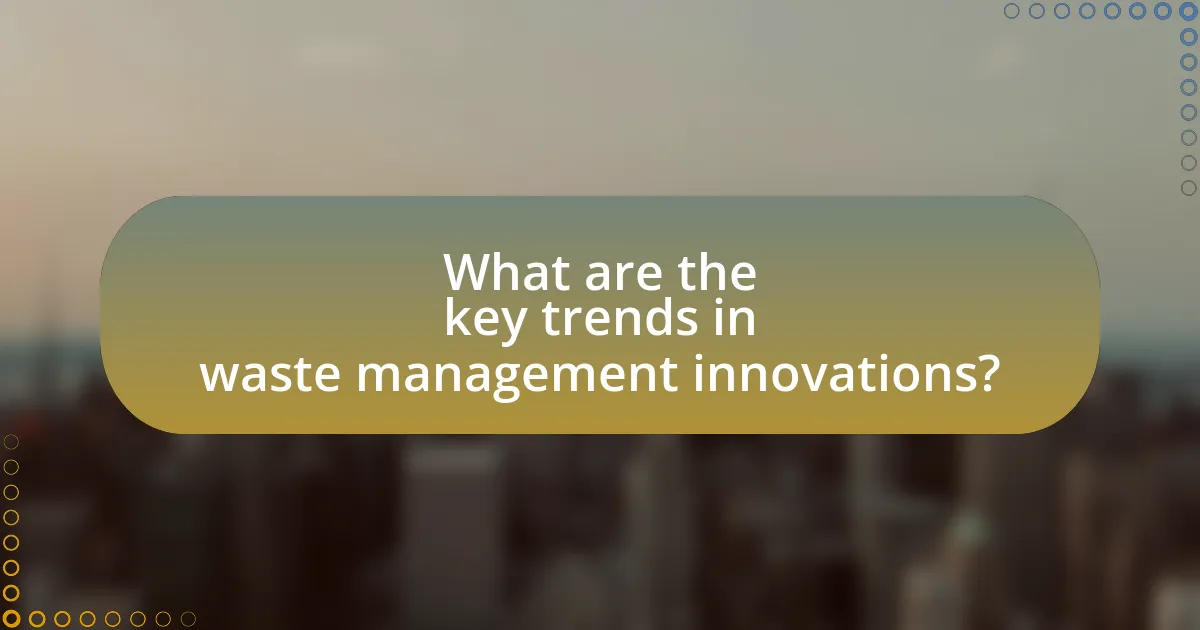
What are the key trends in waste management innovations?
Key trends in waste management innovations include the adoption of smart waste management systems, increased recycling technologies, and the implementation of circular economy principles. Smart waste management systems utilize IoT sensors to optimize collection routes and monitor bin levels, leading to reduced operational costs and improved efficiency. For instance, cities like Barcelona have reported a 20% reduction in waste collection costs through such technologies. Recycling technologies are advancing with innovations like chemical recycling, which can process plastics that traditional recycling methods cannot, thus increasing recycling rates. Additionally, the circular economy approach emphasizes designing products for longevity and recyclability, which has been adopted by companies like Unilever, aiming for all packaging to be recyclable or reusable by 2025. These trends reflect a shift towards more sustainable practices in urban waste management.
How is technology reshaping waste management practices?
Technology is reshaping waste management practices by integrating advanced data analytics, automation, and smart systems to enhance efficiency and sustainability. For instance, the use of Internet of Things (IoT) sensors in waste bins allows for real-time monitoring of waste levels, optimizing collection routes and reducing fuel consumption. According to a report by the World Economic Forum, cities implementing smart waste management systems can reduce operational costs by up to 30% and improve recycling rates significantly. Additionally, artificial intelligence is being utilized to sort recyclables more accurately, leading to higher quality materials being processed. These technological advancements not only streamline operations but also contribute to more sustainable urban living by minimizing landfill use and promoting recycling.
What role do smart bins and IoT play in waste management?
Smart bins and IoT play a crucial role in waste management by enhancing efficiency and optimizing resource allocation. Smart bins are equipped with sensors that monitor waste levels, enabling real-time data collection and analysis. This data allows waste management services to schedule pickups based on actual need rather than fixed schedules, reducing operational costs and minimizing carbon emissions. For instance, a study by the University of Cambridge found that implementing smart waste management systems can lead to a 30% reduction in collection costs and a 50% decrease in greenhouse gas emissions. Thus, the integration of smart bins and IoT technology significantly improves the sustainability and effectiveness of urban waste management systems.
How are data analytics and AI being utilized in waste management?
Data analytics and AI are utilized in waste management to optimize collection routes, improve recycling rates, and predict waste generation patterns. By analyzing data from sensors on waste bins, municipalities can determine when bins are full, allowing for more efficient collection schedules that reduce fuel consumption and operational costs. AI algorithms can also process historical waste data to forecast future waste trends, enabling better resource allocation and planning. For example, cities like San Francisco have implemented AI-driven systems that increased recycling rates by 20% through targeted educational campaigns based on data insights.
What are the emerging practices in recycling and composting?
Emerging practices in recycling and composting include the implementation of advanced sorting technologies, community-based composting initiatives, and the use of biodegradable materials. Advanced sorting technologies, such as AI-driven systems, enhance the efficiency of recycling by accurately separating materials, which can increase recycling rates by up to 30%. Community-based composting initiatives empower local residents to manage organic waste effectively, reducing landfill contributions and promoting soil health. Additionally, the adoption of biodegradable materials in packaging and products supports composting efforts, as these materials break down more easily in composting systems, contributing to a circular economy.
How do these practices reduce landfill waste?
Innovative waste management practices reduce landfill waste by promoting recycling, composting, and waste-to-energy conversion. These methods divert materials from landfills, thereby decreasing the volume of waste that requires disposal. For instance, recycling can recover up to 75% of materials that would otherwise end up in landfills, as evidenced by the Environmental Protection Agency’s data indicating that recycling and composting prevented the release of approximately 186 million metric tons of carbon dioxide equivalent into the air in 2018. Additionally, composting organic waste reduces landfill contributions by transforming food scraps into valuable soil amendments, further minimizing waste. Waste-to-energy technologies convert non-recyclable waste into usable energy, significantly reducing the amount of waste sent to landfills while generating power.
What innovations are being made in biodegradable materials?
Innovations in biodegradable materials include the development of bioplastics made from renewable resources such as cornstarch, sugarcane, and algae. These materials are designed to decompose more quickly than traditional plastics, reducing environmental impact. For instance, researchers at the University of Massachusetts Amherst have created a biodegradable plastic that can break down in soil within a few months, compared to conventional plastics that can take hundreds of years to decompose. Additionally, advancements in enzyme-based degradation processes are being explored, which can enhance the breakdown of biodegradable materials in various environments, further supporting sustainable waste management practices.
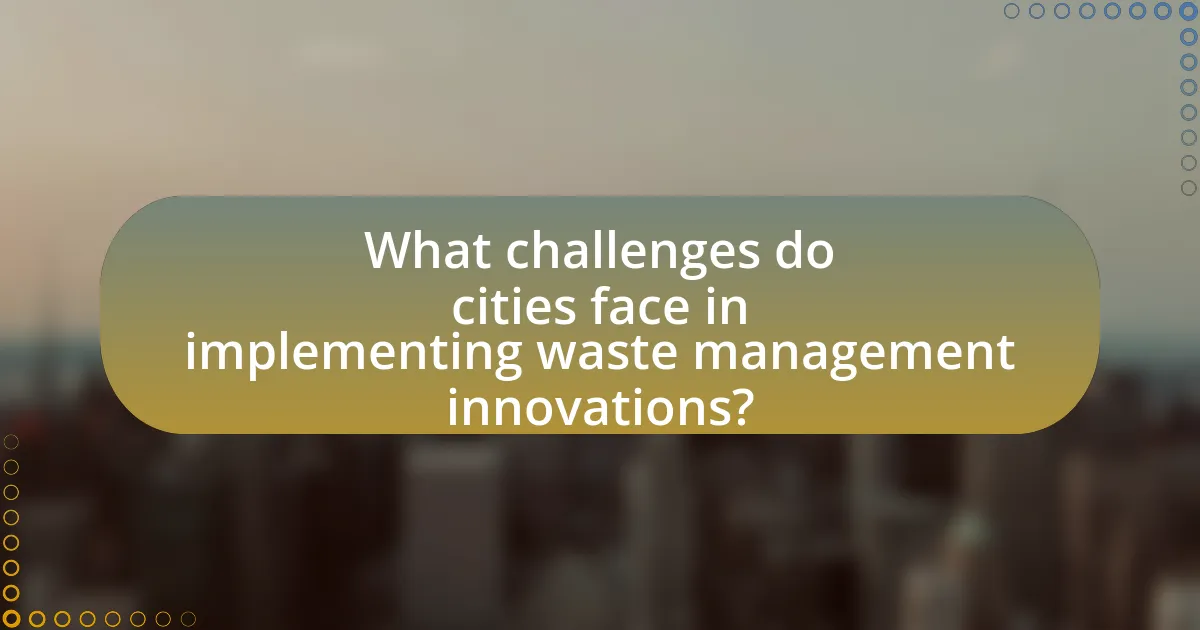
What challenges do cities face in implementing waste management innovations?
Cities face significant challenges in implementing waste management innovations, primarily due to financial constraints, regulatory hurdles, and public resistance. Financially, many urban areas struggle to allocate sufficient budgets for new technologies and systems, which can be costly to develop and maintain. Regulatory hurdles often arise from outdated policies that do not accommodate innovative practices, making it difficult for cities to adopt new methods. Additionally, public resistance can stem from a lack of awareness or understanding of the benefits of these innovations, leading to pushback against changes in waste management practices. These factors collectively hinder the effective implementation of sustainable waste management solutions in urban environments.
How do financial constraints impact waste management initiatives?
Financial constraints significantly hinder waste management initiatives by limiting the resources available for infrastructure development, technology adoption, and operational efficiency. For instance, municipalities facing budget cuts may delay or scale back essential waste collection services, leading to increased litter and illegal dumping. A study by the World Bank indicates that cities with constrained budgets often struggle to implement innovative waste management solutions, such as recycling programs or waste-to-energy facilities, which require upfront investment but yield long-term benefits. Consequently, financial limitations can result in outdated practices that fail to address the growing challenges of urban waste management effectively.
What funding models are available for sustainable waste management projects?
Various funding models are available for sustainable waste management projects, including public funding, private investment, public-private partnerships, and grant programs. Public funding often comes from government sources at local, state, or national levels, aimed at supporting environmental initiatives. Private investment involves funding from corporations or individuals seeking to support sustainable practices while potentially gaining financial returns. Public-private partnerships combine resources and expertise from both sectors to implement waste management solutions effectively. Additionally, grant programs from non-profit organizations and international bodies provide financial support specifically for innovative waste management projects, often requiring adherence to sustainability criteria. These models collectively enhance the financial viability and implementation of sustainable waste management initiatives.
How can public-private partnerships enhance waste management solutions?
Public-private partnerships can enhance waste management solutions by leveraging the strengths of both sectors to improve efficiency, innovation, and resource allocation. These collaborations allow for the sharing of expertise, where private companies bring technological advancements and operational efficiencies, while public entities provide regulatory frameworks and community engagement. For instance, a study by the World Bank highlights that cities utilizing public-private partnerships for waste management have reported up to 30% cost savings and improved service delivery. This synergy not only optimizes waste collection and recycling processes but also fosters sustainable practices, ultimately leading to cleaner urban environments.
What social factors influence the success of waste management innovations?
Social factors that influence the success of waste management innovations include community engagement, public awareness, and social norms. Community engagement fosters collaboration between local governments and residents, leading to tailored solutions that meet specific needs. Public awareness campaigns educate citizens about the importance of waste management, encouraging participation in recycling and composting programs. Social norms shape behaviors; when waste reduction practices are widely accepted and practiced within a community, individuals are more likely to adopt similar behaviors. Research indicates that cities with strong community involvement and awareness initiatives report higher rates of recycling and waste diversion, demonstrating the critical role of these social factors in the effectiveness of waste management innovations.
How can community engagement improve waste management outcomes?
Community engagement can significantly improve waste management outcomes by fostering collaboration between residents and local authorities, leading to increased awareness and participation in recycling and waste reduction initiatives. Engaged communities are more likely to adopt sustainable practices, as evidenced by a study conducted by the University of California, which found that neighborhoods with active community programs saw a 30% increase in recycling rates compared to those without such initiatives. This engagement not only enhances compliance with waste management policies but also encourages innovative solutions tailored to local needs, ultimately resulting in more effective waste management systems.
What educational initiatives are necessary for promoting sustainable practices?
Educational initiatives necessary for promoting sustainable practices include integrating sustainability into school curricula, providing community workshops on waste management, and implementing training programs for local businesses. Integrating sustainability into curricula ensures that students learn the importance of environmental stewardship from an early age, fostering a culture of sustainability. Community workshops can educate residents on effective waste reduction techniques, recycling practices, and composting, which are essential for urban living. Training programs for local businesses can encourage sustainable practices in operations, such as reducing waste and adopting eco-friendly materials. These initiatives are supported by studies showing that education significantly influences sustainable behavior, as evidenced by the United Nations Educational, Scientific and Cultural Organization (UNESCO) reports highlighting the role of education in achieving sustainable development goals.
What best practices can cities adopt for effective waste management?
Cities can adopt several best practices for effective waste management, including implementing comprehensive recycling programs, promoting waste reduction initiatives, and utilizing technology for waste tracking. Comprehensive recycling programs can increase recycling rates significantly; for instance, cities like San Francisco have achieved over 80% diversion from landfills through robust recycling and composting efforts. Promoting waste reduction initiatives, such as encouraging businesses to minimize packaging and consumers to choose reusable products, can further decrease waste generation. Additionally, utilizing technology, such as smart bins equipped with sensors to monitor waste levels, can optimize collection routes and reduce operational costs, as demonstrated by cities like Barcelona, which have improved efficiency through data-driven waste management solutions.
